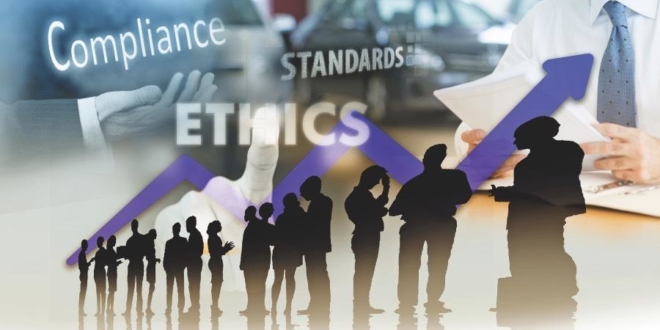
F&I offices find that complying with the law often correlates with ethical behavior, and vice versa. Photo credit: AUTOMOTIVE NEWS ILLUSTRATION
In the 1970s, just a few years after finance and insurance departments were established, unethical behavior at dealerships was often hidden and secretly praised. But in the last few decades, the F&I office has slowly but steadily made ethics a priority.
The evolution of ethics in F&I has been “a long, slow process,” said George Angus, president of Team One Research and Training. In the 1970s, when Angus started working in auto retail, “Everything was swept under the rug and winked at.”
Today, sweeping bad behavior under the rug is more difficult to get away with. Dealers set policies to weed out unethical characters, and social media and consumer resources often shed light on unethical business practices.
Those policies have worked, according to results from a DealerRater-Automotive News consumer survey. Of 9,708 consumers who recently visited a dealership to buy or lease a vehicle, more than half said they trust the financing process more than they did a decade ago.
“Ethics have improved partly because we are more aware that we have got to treat the customer right if we ever want to see them again,” said Matt Woods, south regional manager for Service Group, an F&I product and training company in Austin, Texas. “For years, the car business was a game without rules that were enforced.”
Dealerships, and especially F&I departments, have long had a reputation of dishonesty among consumers — notoriety Angus said they once deserved.
“But today, the vast majority of auto dealers are honest and upfront. And they have standards within the dealership,” said Angus. “The idea that dealers are going to rip you off doesn’t fly with the buying public anymore. Ethics is a smart business decision.”
Much of that better behavior is driven by compliance training, which skyrocketed over the last two decades as regulators began policing auto retail more aggressively, said Woods. Although compliance pertains to following the law and ethics is a judgment of right vs. wrong, they often overlap, and they both center on an awareness of doing the right thing.
“Compliance drives ethical behavior; ethical behavior drives compliance. I think they go hand in hand,” said Woods.

Woods: Training makes difference
Informed customers
Consumer trust grows
- I trust the financing process more than I did a decade ago: 57%
- My opinion hasn’t changed; I’ve always trusted the process: 35%
- My opinion hasn’t changed; I’ve never trusted the process: 5%
- I trust the financing process less than I did a decade ago: 3%
Source: DealerRater-Automotive News survey Nov. 26-29 of 9,708 consumers who recently purchased or leased a vehicle
Because of the advent of the Internet and social media, customers have more information at their fingertips than ever before, which makes duping them an imprudent business move.
“There is a term in our American lexicon, and it has to do with skepticism: buyer beware,” said Woods. “We have a free market. A vendor can charge or a seller can charge what they want.”
But now consumers have resources, such as Consumer Reports and Edmunds, to do research.
It’s not technically illegal to charge $3,000 for a lifetime of car washes. “But what’s really the value of that?” Woods said. “If the price we’re charging far exceeds the value, that’s where there can be an ethical issue involved.”
And if customers believe they were treated poorly, their experience likely will come back to haunt the dealership. With social media, “You just can’t hide anymore. People will talk about their experience; people will talk about how they were treated,” Woods said.
F&I managers who make unethical decisions also may put their careers in jeopardy, said Angus. People in the industry all know one another and talk.
“Everything that you do, you’ll hear about 30 years from now,” he said.
If dealership employees are asked to do something unethical, they should quit, Angus said. Unethical behavior perpetuates a stigma the industry has long tried to shake. So if a dealership has honest employees and practices, he said, “You have a weapon in your arsenal [customers are] not prepared for.”
What’s at stake?
Much of the unethical behavior that still occurs today isn’t driven by the dealer but by middle management, said Woods.
Most employees don’t have an attachment to the dealership the same way the dealer does, Woods said. They have less at stake. If customers have an issue at the dealership and know the dealer, they will talk about it. “There is reputational risk,” said Woods.
And dealers still bear responsibility for what employees might do, as it is dealers who must set clear policies, make sure employees are trained and verify that policies are followed.
To prevent a flippant attitude among employees, Woods said, dealers should invest in their employees and their culture. Then, “They will view your risk as their risk,” he said.
Today’s dealerships, for the most part, prioritize transparency and don’t deserve a dirty reputation, Woods said.
There are still crooks out there, Angus added, “but there are in any business.”
“Today, dealers are interested in a quality operation,” Angus said. “Those that aren’t will be driven out.”
